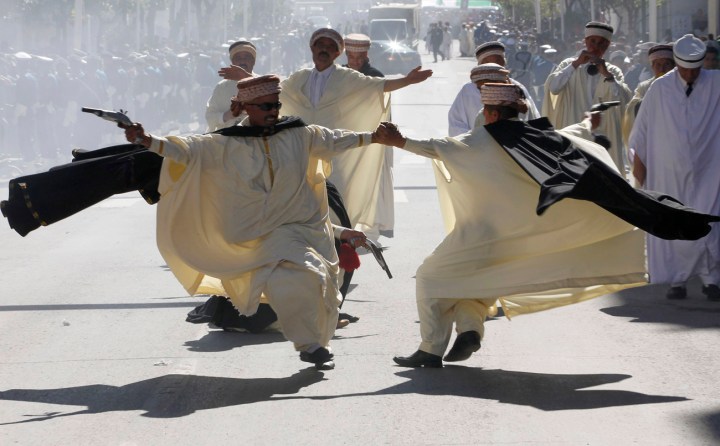Algeria goes to the polls on Thursday to elect a new parliament. With some bravado, the Algerian government has promoted these elections in advertisements as “Algeria’s Spring”, invoking the spirit of the Arab Spring. But this is just another opportunity for the country’s political elite to gain a semblance of legitimacy. By KHADIJA PATEL.
Political pundits have long touted Algeria to be the scene of the next, great Arab uprising. Yet, last year, as an infectious appetite for political change spread from Tunisia across North Africa and the Arabian Peninsula, Algeria maintained its status quo.
Days before Mohammed Bouazzizi’s self-immolation in Tunisia in December 2010, Algeria was rocked by massive youth riots targeting private stores, government offices, post offices, schools and other symbols of public authority.
Three-quarters of Algeria’s population of 37 million are under 35 and like other restless, young populations in the developing world they reel under the twin burdens of unemployment and rising food prices.
The December 2010 riots were fuelled by increases in the price of cooking oil and sugar as well as other commodities, but they quickly took on anti-government overtones, with protestors chanting slogans denouncing the Prime Minister Ahmed Ouyahia and the President, Abdelaziz Bouteflika, calling for the fall of the regime.
As protests in Tunisia gathered momentum, Algeria’s riots spread into 20 more provinces. The country’s business community, the semblance of opposition and the governing parties all chimed in with condemnation of the youth violence, urging young people to use existing political channels to voice their grievances.
And though self-immolations mimicking Bouazzizi were reported, the country proved exceptional, numb to the infectious appetite for political change that had been let loose on the streets across North Africa and the Arabian Peninsula.
President Bouteflika failed to comment on the youth riots, choosing instead to announce a host of price cuts and arrest the recalcitrant youth. The government was content to be patient, confident that the young dissidents would eventually grow tired of shouting in the streets and accept the piecemeal offerings of the price cuts.
The government was proved right. The riots died down by early to mid-January 2011 and the government in turn announced reforms in politics, economics, youth policy and law. As one analyst puts it: “This process reflects both the regime’s ability to learn from the ongoing experience of its neighbours, Tunisia and Egypt, as well as an important self-perception that lent itself to a more cautious approach to the crisis that did not precipitate as dramatic a turn of events as it might have otherwise.”
Popular discontent with the Algerian government certainly does exist, but after a decade of extreme violence between the military regime and armed Islamists in the 1990s, the military-backed government has succeeded to thwart the formation of a strong opposition or indeed even a formidable civil society.
And so, on Thursday, Algeria hosts parliamentary elections that promise to be the freest ever. Over 21 million Algerians are registered to vote for the 44 parties, half of which were only legalised this year as part of the government’s reforms. The parties are competing for a 462-member parliament that Bouteflika promises will have a say in rewriting the constitution, but there is little faith that this parliament will be any better placed to serve the people.
The government all the way up to Bouteflika has been pleading for people to come out and vote, but years of rigged polls have left people cynical about the potential of the political process to bring about any real change.
The statistics don’t bode well for a strong turnout. Since 1997, turnout for legislative elections has fallen with each electoral cycle, hitting an all-time low in 2007 with 34% of citizens casting their vote by official tallies. Opposition parties and citizens routinely boycott official elections. “At a popular level, ordinary Algerians strongly disassociate from their government leaders, which many see as a sham imposed by the military, which has dominated the country’s politics since 1965,” one regional analyst surmised.
Algeria, despite its façade to the contrary, remains an authoritarian state. The president is all-powerful. His power is institutionalised through restrictive laws governing public assembly, association, speech and media. If Algeria does hold regular municipal, provincial, parliamentary and presidential elections, the Freedom House institution still rates the country as “Not Free”.
The elections are expected to produce a fractured legislature divided between government parties, an Islamist alliance and a smattering of smaller groups. Although regional trends suggest an upsurge in votes for the Islamist-aligned parties, analysts point out that the various Islamist factions that have been part of the political process for years have failed to garner significant support. Many observers believe the president will then weld together a government of national unity of the main parties to implement his “reformist” agenda.
With this election, the Algerian government is trying hard to prove to the world that it is indeed geared towards a more-encompassing democracy. One distinguishing factor is that a large number of foreign observers have flown in: the Carter Centre, the National Democratic Institute, the European Union, the Arab League, even the African Union has made the trip. The government wants desperately for this election to be seen as free and fair. As one columnist wrote recently, “Two hundred million dollars have been spent for transparent ballot boxes (the old ones weren’t see-through enough?)”
The Arab Spring may have bypassed Algeria, but it has certainly placed some pressure on the Algerian government to appear to have taken heed from their neighbours’ travails. Yet last weekend, Ouyahia openly attacked the Arab Spring as “a plague” sweeping the region. He blames the Arab Spring for, “the colonisation of Iraq, the destruction of Libya, the partition of Sudan and the weakening of Egypt”.
“The revolutions that engulfed brotherly and friendly countries such as Iraq, Sudan, Tunisia, Mali, Libya and Egypt are not accidental but are the work of Zionism and Nato,” he continued. “The Nato countries grant visas to young people according to their objectives, to train in new technologies to create unrest…”
Invoking the romance of Algeria’s independence struggle against France, he said: “The Arab Spring for me is a disaster. We don’t need lessons from outside, our spring is Algerian, our revolution of November 1, 1954.”
His words speak louder than any semblance of political reform. For Algerians, these elections portend more of the same – parties will participate in the unfolding political spectacle, they will receive the backing of the military and the ageing political elite, and they will revert to serving their own nefarious ends, ignoring the concerns of ordinary Algerians. It’s just the way things are. DM
Read more:
- Algeria’s election looms, but there are no great expectations in the Guardian.
Photo: Members of a local dance troupe perform during a visit by Algeria President Abdelaziz Bouteflika at the commemoration of the Algerian war of independence during May 1945, in Setif May 8, 2012. REUTERS/Louafi Larbi.




















 Become an Insider
Become an Insider